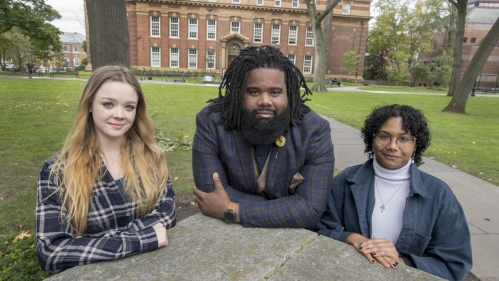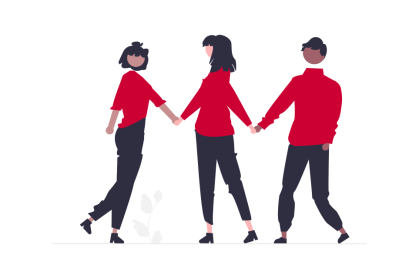
Diversity Peer Educators
Fostering Inclusive and Brave Conversations
Diversity Peer Educators (DPEs) consist of Rutgers–New Brunswick students committed to educating their peers on topics of diversity, inclusion, and social justice. DPEs serve as a resource and provide workshops/educational sessions. The session topics will be tailored to educate students on identity development, race, class, gender, sexuality, abilities, and more. DPEs are trained to facilitate inclusive and brave conversations. DPEs are an integral part of enhancing our student affairs commitment to building inclusive communities across the New Brunswick campus.
Get Involved with DPE Program Request a Diversity Peer Educator
Contact Us
The Diversity Peer Educators program is coordinated through the Center for Social Justice Education and LGBT Communities and the Department of Residence Life.
If you have specific questions, please contact Darnell Thompson, assistant director of the Center for Social Justice Education & LGBT Communities. You can also email ru.dpe@rutgers.edu for general questions and inquiries.
Apply to be a Diversity Peer Educator

If you would like more information about the DPE program or the application process, please contact ru.dpe@rutgers.edu.
Eligibility
- Be a full-time Rutgers University–New Brunswick student
- Have a minimum cumulative grade point average (GPA) of 2.75
- Be in good academic and judicial standing at the time of application and for the duration of employment
Responsibilities
- Organize and execute at least four workshops/sessions per semester
- Develop and facilitate an open dialogue session
- Attend bi-weekly DPE meetings
- Participate in social media campaigns
- Be available for other duties as needed, such as open/drop-in hours, planning meetings, professional development sessions, and scheduled retreats
DPEs will utilize their training in basic facilitation skills to engage participants in brave conversations. They will guide debrief discussions on a chosen topic and challenge participants to take what is learned into their communities across campus.
Required Training
DPEs must complete a training course and online training modules.
DPE Course In Detail
The DPEs will go through a curriculum-based training course to prepare for their role. This training will be a mandatory course that will meet once a week. The course will consist of a series of activities, discussions, readings, and writings that will be used to expand the participants' knowledge about diversity from a historical and contemporary perspective. At the completion of the course, DPEs will work to develop programs for their respective functional areas.
Compensation
DPEs may potentially have the opportunity to utilize the required course and experiences as a DPE in their pursuit of a social justice minor in the Department of Women’s and Gender Studies.
The Social Justice Minor is designed to introduce students to the complexity of social justice issues, cultivate their capacity to identify key determinants of structural inequities, familiarize them with various social justice practices and strategies, and prepare them for advocacy and activism to address these pressing issues.
The Social Justice Minor draws upon resources in multiple academic units, disciplines, and interdisciplinary programs to involve students in ongoing struggles to define and achieve social justice locally and globally. Through individual courses that incorporate service learning, as well as internships, study abroad, and alternative spring break experiences, students are encouraged to recognize injustice and work to eradicate it. Among the manifold dimensions of injustice, the social justice minor pays particular attention to modes of exploitation, marginalization, structural and physical violence, and cultural imperialism that produce systems of advantage and disadvantage. Students who complete the 18-credit program will learn to think analytically, integrate social justice theory and practice, identify structural constraints and trace their operation across social, economic, political, cultural, and environmental terrains, understand the effects of various social and economic policies on the scope and intensification of inequality, and grasp the complex interrelation of local and global justice issues.
Other Opportunities
If you are interested in developing your cultural competencies and ability to have difficult conversations, ask about the DPE Course!
Adapted from the social change model, this course challenges its participants to engage in difficult conversations, challenge inequity in systems and create a learning session for peers to engage in a passion project area centered on a social justice topic.
If you are a student leader or aspiring student leader, this course can help you develop your skills in leading discussions about identity topics. As we center traditionally marginalized identities, the course uses reflective writing, historical frameworks, and discussion techniques to create learning opportunities that facilitate socially just practices.
Use this course toward a Social Justice Minor!
Contact Us
The Diversity Peer Educators program is coordinated through the Center for Social Justice Education and LGBT Communities and the Department of Residence Life.
If you have specific questions, please contact Darnell Thompson, assistant director of the Center for Social Justice Education & LGBT Communities. You can also email ru.dpe@rutgers.edu for general questions and inquiries.
